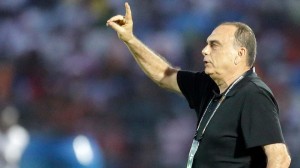Avram Grant's Ghana challenge off to rough start at the Africa Cup of Nations
Poor Avram Grant. For the former Chelsea coach, this was a desperately difficult start to life as Ghana coach. As a bat fluttered back and fourth above his head at the post-match press conference, he looked even more morose than usual, on the one hand insisting that his side’s spirit had been good in its African Cup of Nations defeat to Senegal and that he was confident that Ghana would still progress, but acknowledging on the other that his players had struggled to deal with the height and power of Alain Giresse’s team.
He might also have acknowledged he was outwitted tactically as Senegal, 1-0 down at halftime, switched to a back four and came back to win 2-1. The Ghanaian press has not yet turned on him, but even after just one competitive game in charge, there was a sense of frustration and plenty of people wondering just why he had been appointed.
Perhaps the surprise was not that Ghana turned to a foreign coach with European experience but that Kwesi Appiah lasted so long. Ghana wasn’t impressive at the last Cup of Nations, reaching the semifinal thanks to a relatively simple draw and a rather fortunate victory over Cape Verde in the last eight but looking lethargic throughout. Appiah was kept on but, rather demeaningly, was sent to attend coaching courses that would, in theory, improve his performances.
At the World Cup Ghana played well in spells, and could easily have got better results in all three group games, but its tournament was overshadowed by a row over bonuses, that culminated in the cash the players were owed being airlifted to Brazil. Nobody seems to doubt that the Ghanaian football federation was obliged to pay and was in the wrong, but the players’ naked glee when it arrived was unseemly, particularly given the economic crisis gripping Ghana.
The Cup of Nations qualifiers brought little improvement. Ghana got through, but never quite seemed to play to potential, taking a single point from two games against Uganda. Appiah finally left his post in November and after Milovan Rajevac, the Serbian who managed Ghana at the 2010 World Cup, and Jose Ignacio Martinez were considered, Grant was appointed.
The Israeli, now 59, was never particularly rated in England. At Chelsea, he suffered for being the man who replaced Jose Mourinho, despite taking the club to its first Champions League final, and, after a less than stellar time at Portsmouth, he was manager of West Ham when it was relegated out of the Premier League. Since then, he has only one role as head coach, leading Partizan Belgrade for five months; it won the Serbian title, but under Grant its lead was narrowed.
He was director of football at the Thai club BEC Tero Sesana when the Ghanaian federation approached him. Indifferent as his recent record may be, Grant has a reputation in Ghana because of the popularity of Chelsea, thanks to the years Michael Essien spent at the club.
“He has a very high profile, we know he was in Chelsea and he can help the team to move forward,” said Chelsea attacking midfielder Christan Atsu, who is on loan at Everton. “We had great coaches who applied for the job and when you hear the news in Ghana, a lot of the fans prefer Avram Grant because of his profile, because of his experience and because of how far he has gone in football."
One of his first decisions was the adoption of a back three seemingly in response to the lack of natural width in the side. That allowed him to give Dede Ayew a central role in a 3-4-2-1. On Monday, against Senegal, he was deployed behind his brother Jordan, although he was deputizing for Asamoah Gyan, who was sidelined after what was described as a “mild bout of malaria.”
With both sides fielding back threes, the game had looked to be settling into a stodgy midfield battle when, after 13 minutes, Emmanuel Agyemang Badu laid in Atsu. Former MLS goalkeeper Bouna Coundoul was slow off his line, Atsu got to the ball first and was hauled down by the keeper for an obvious penalty, that Dede Ayew converted.
Thereafter, Ghana sat back and looked to contain Senegal. Although Atsu could have doubled its lead after a fine run from Jordan Ayew, the bulk of the chances fell Senegal’s way. Serigne Mobodji headed against the bar, and Mama Biram Diouf had an overhead tipped over before halftime, which brought a switch to a back four and an increase in Senegal’s domination.
Senegal leveled on 58 minutes as Biram Diouf followed up to nod in after his initial header had come back off the post and then won it deep in injury-time as substitute Moussa Sow ran on to a flick to score with a neat finish. In what is by far the toughest group, one that also includes Algeria and South Africa, that leaves Ghana in serious danger of failing to make the last eight.
“It was a tough game for us,” Grant said. “We played against a team with a lot of experience and very physical players. The players showed good spirit and fighting spirit and are looking forward to the next game.”
He must also, though, be approaching Friday's clash with Algeria with a sense of trepidation, particularly with Gyan’s fitness far from clear. Lose there, and Grant will be the first coach to fail to take Ghana through the group stage of the Cup of Nations since 2006.


Comments
This article has 0 comment(s) , give your comment